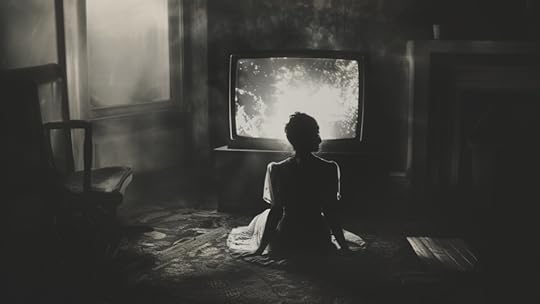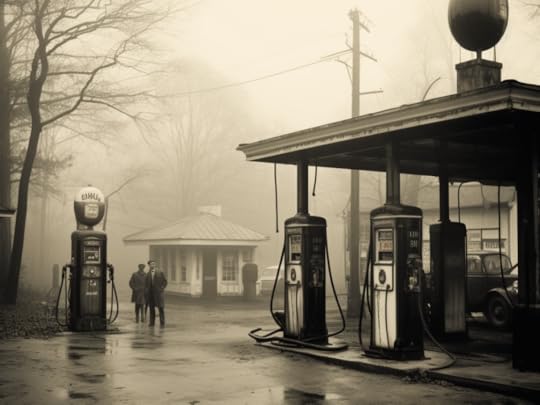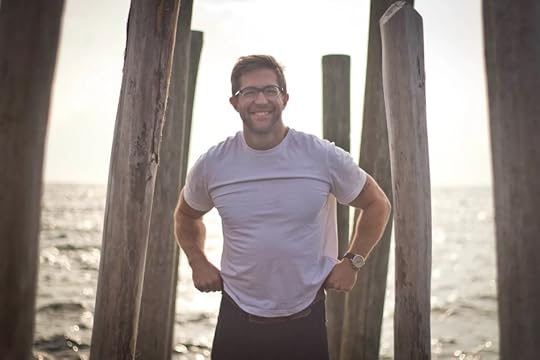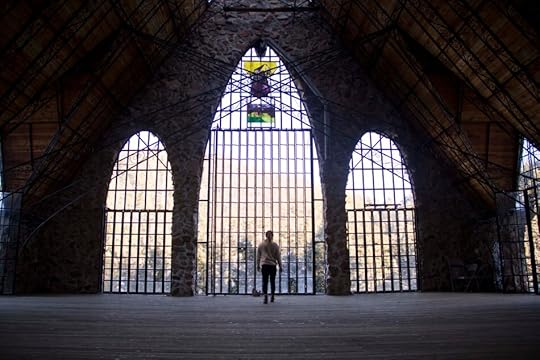Ethan Renoe's Blog, page 9
July 20, 2024
“Attempt to live a life with no secrets.”

Recently I was meeting with a mentor of mine and bemoaning the fact that I couldn’t quit all of the various addictions and habits that besieged me constantly. I’ve become a slave to sin. I wanted to stop so badly, and for over a decade I’ve been on the hunt for the magic bullet that will finally give me freedom.
I hoped my mentor would load it into the chamber. (Why is magic bullet a phrase? I don’t want to get shot! Why not magic hamburger?)
Well, he did serve me a magic hamburger, but not in the form I expected.
After hearing me wail about my issues for a few minutes, he asked why I wanted to quit so badly. Of course, the answer seemed obvious. Porn is bad. So quitting must be the highest priority. Or else God will be disappointed and my future family will fall apart.
Turned out that I didn’t have any deeply personal motives to quit. At best, I half-heartedly wanted to give up these things that actually felt good, but I also knew that I should, for my future wife and kids and my life and of course, my integrity.
At last, he gave me his secret sauce:
“Try to live a life with no secrets.”
That’s it? I thought. Even though it seemed too simple, it stuck with me. And as my brain chewed on it with its gray matter teeth the following days, I realized the brilliance of it.
Now, what it does not mean is: Live such a perfect life that there is nothing you need to hide from anyone. This is impossible and unattainable, unlike living a life with no secrets.
It also does not mean that you need to tell everyone everything. This would also be unhealthy. Not everyone needs to know every little detail of your life–especially the more personal bits.
But what it does mean is, there should be nothing in my life that at least one other person doesn’t know about.
Why is this?
Well for one, our shame thrives in the dark. The more things we have hidden, the more unhealthy we are, both emotionally and even physically, according to studies.
Not holding in all of our secrets frees us.
There were years where I would be nervous every time someone picked up my phone: what if they looked at the wrong folder or stumbled upon the wrong conversation in my messages? There was a constant anxiety and tension that accompanied holing onto so many secrets.
The thing about sharing your secrets, even the deep dark ones, is that they seem far bigger to you than anyone else. One teenage student came to me and confessed that he struggled with porn. It was evident that I was the first person he ever told, and he told me as much, and he was petrified. I’m not sure what he thought would happen upon his confession.
I said, “okay.”
And we began to discuss it and how we can work on it and try to team up to identify the roots of his struggle. It was such a non-issue, and a non-surprise to me that it didn’t affect my life, or how I perceived him in the slightest. Yet to him, it was this mountain of a burden on his back. Our own secrets always seem crushingly bigger to us than they ever will to others. (Of course I cared about it because it was affecting the life of a student of mine, and it was a big deal to him. But it didn’t change how I saw him at all. You get what I mean.)
Shame and addictions and all the rest thrives in isolation. There is nothing your shame wants more than to get you alone and keep you alone. It wants to stay hidden.
You can also think about it as practice for marriage. I’m single, but I don’t want to be the type of person sneaking around and keeping things from my wife when I’m married. Do I think I’ll magically become more honest or less secretive once I get married? Why not start practicing now?
Becoming an open person who doesn’t hide anything is not only a more honest and healthy way to live, but it helps to address the issue itself. The more you rob your shame of its power, the less you feel the compulsive need to act out and continue those same old bad habits.
So try it: See if you can go a week without keeping anything a secret. Of course, this also means no lying. And it doesn’t need to be with everyone: I have roughly 3 people in my life who know everything about me and my life. And they can always point me straight and be direct with me (something they could not do unless I was totally honest with them and held nothing back).
Give it a shot and let me know what you think!
e
The post “Attempt to live a life with no secrets.” appeared first on ethan renoe.
June 16, 2024
You can’t be ‘spiritual but not religious’

Recently I was talking to a girl who said something interesting to me. She said, “I’m not religious at all. I’m spiritual and try to be faithful though.”
I thought the idea that one could be ‘faithful’ without an object or system was fascinating, albeit, inane. I asked her what she’s being faithful to, if there is no God, no rules, no revelation, nothing to really be faithful to.
She, unsurprisingly, hadn’t put too much thought into it. Yet, this idea is incredibly popular in our western culture at large. “Spiritual but not religious” is one of the most common religious identities I see on dating apps. But in all honesty…what does it mean??
When someone says he is being ‘faithful to his wife,’ what does he mean? Well, it’s not some vague adherence to her as an entity. When two people are married, they don’t commit to a vague, abstract idea of marriage. They stand before witnesses and state what and who they are committing to. That way, they will know if and when they’re being unfaithful to their spouse, since they explicitly stated what it is they are committing to.
Being faithful to their spouse is synonymous with being faithful to the vows made on that day. They know who and what they are being faithful to.
It’s similar spiritually. When someone says they are ‘faithful but not religious,’ or don’t believe in a god, they are saying that they know neither who nor what they are committed to, what they’re faithful to. (But darn it, THEY’RE COMMITTED TO IT!)
It’s really a useless statement.
“I’m faithful to my wife, but I don’t know who she is, what she looks like, or what she expects from me, so I’m just vibing. But I’m definitely married to her…whoever she is.”
You’d call that guy insane.
The word ‘religious’ comes from the Latin word religare, which means ‘to bind,’ as in with ropes. So, a religious person is one who has bound themself to God. By this definition, it’s really is synonymous with ‘faithful,’ as these people have committed, without remorse, that they will be near to the God they worship; that they know who God is, and that they know what God wants for and from them. It’s a beautiful term. Isn’t etymology great?
(Granted, the word in today’s parlance has come to mean ‘someone obsessed with rules, who looks down their nose at others, who is judgmental, or who is obsessed with going to church and doing the rituals.’ So I understand people not wanting to be like that.)
But no, I don’t think one can be ‘spiritual but not religious.’
Being spiritual implies that you believe something about the unseen realm, including your own spirit or soul. You have a system by which you think spiritual things work (many such folks typically base these off of their own experience, desires, and what’s convenient for them…), which implies that there are, in fact, rules.
Every person on earth believes that there are rules. Even simple ones like, “be tolerant of other people and their beliefs.”
Why? Who says? Why is that an objectively good thing? Someone may believe this and hold to it as a universal spiritual truth…but where did it come from? Nearly every person has rules and a map of their ‘spiritual system.’
…And that means that all of us are, to some degree, religious. We all have at least a loosely-constructed spiritual system.
And what’s the term for a spiritual system?
Say it with me now…
A religion.
You can’t be faithful without being religious.
You can’t be spiritual without being religious.
The only other option is Nietzsche’s route, where you simply adhere to power and erase all morals and ethics. Whoever is most powerful makes the rules and everyone else follows them. There is no universal right and wrong. We’re all building our own sandcastles and the tide is rising.
But if there is something larger out there making rules and designing the way the universe functions, it may be worth finding out more about how it’s all intended to work, and attempt, in our own feeble ways, to be faithful to that.
e
P.S. There is also the agnostic argument (agnostic = a+gnosis in Greek; unable to be known) which says that God is so beyond our comprehension that there would be no way to know anything about this being. Our little human minds couldn’t comprehend. Well yes…unless that God enters into our own reality and reveals Godself to us. Unless He joins us as a human, speaks human language so we can understand it, and essentiall,y makes the first move. Could we reach up and know this God? No. But what if He came down and made Himself know to us? Is that an option?
The post You can’t be ‘spiritual but not religious’ appeared first on ethan renoe.
May 2, 2024
Worship looks more like entertainment, and entertainment looks more like worship.

In Worship and the Reality of God, John Jefferson Davis (yes I checked, and he was never president of the United States) describes three ordinary scenarios: Shopping in a mall, driving your car on the highway, and watching a movie or TV show.
Totally normal, right?
You’d never stop and ask a question like, SHOULD I be doing one of these things? because they’re all so incredibly normal.
And you probably wouldn’t ask the extension, How is this action shaping and forming my spiritual life? My desires? etc.
But it gets real weird when you stop and realize that none of those things existed in their current iteration 100 years ago. Only the rich had cars, movies were barely a thing, and shopping was primarily for necessities. The first mall didn’t open until 1956, so the idea of ‘shopping’ as a social or meaningful activity, as opposed to buying some goods to survive at the marketplace, was not a thing 100 years ago.
And these things definitely didn’t exist 200+ years ago.
Writes Davis:
“When I go to the mall and enter the movie theater or surf the Internet at home, I may be consuming not material goods, but experiences and simulations. As I surf the net or watch the ads for the coming attractions in the theater, I am drawn into the commercial nexus that connects driving in my car, a trip to the shopping mall and the world of entertainment. All three worlds of everyday life are interlocking and mutually reinforcing. When I walk through the doors of the church, I need to change my mindset and consciously remind myself: This is not like driving my car; I am not in control; I will go where God wants to take me; this is not a trip to the mall; this is not about “consumption,” this is not about “entertainment,” but about the praise and presence of God—the God who is more lastingly real than the car in which I drove to get here.”
Look at just how manufactured all these experiences are by people who want to profit off of us with them. Not one of those three things exists apart from swarms of people and corporations trying to make a FAT stack of money off of us using and consuming them.
And how I’ve spent full days (or weeks) of my life doing just those three things back to back. My friends and I may plan a fun and lazy shopping day on a Saturday, capped off with a movie either in the theater or in a home. We literally only do the three things described above for an entire day (driving to and from the stores and theaters and houses of course).
And again… not one of them existed 200 years ago.
Maybe shopping in a marketplace, but it definitely didn’t look the way it does now and looking at the perfected models on the posters didn’t have the same sort of transcendent religious quality. You didn’t think your life would radically be altered by buying a shirt or pair of shoes because of the life portrayed by the models in the ad. They’re the new religious icons on the walls of our modern sanctuary: The shopping mall.
James K.A. Smith and Donald Fairbarn both have expounded on the re-modeling of modern life as replacements for the places churches and religion used to occupy. They describe how, for 2,000 years, one would step into a cathedral and immediately feel transported to a space or feeling that was inherently different from the spaces they inhabited the rest of their week. They’d feel higher or, maybe even, holy.
Embedded in every cathedral is vivid and ornate imagery, typically of Jesus and the saints. And what were they doing? Playing out certain acts from their lives which were selfless, righteous, and again…holy.
And what would the congregants glean from being in the cathedral week-in and week-out? They’d eventually want to model their lives after the habits created by the worship service and the lives they saw on the walls: the selfless and sacrificial saints.
But the mall is the new cathedral, and models are the new saints.
And churches today are so modern and refined that they just look like malls or concert halls. No different ‘feeling’ than the rest of your week. You don’t feel transcended or disoriented as you should; as you would when you went into a cathedral and felt like you were nearer to God.
The point of cathedral architecture was to notably shake up your week and draw your attention upward, so it didn’t FEEL like everywhere else you’d go in your week. Worship was formational and both dis-orienting and re-orienting.
Dis-orientation is important for the worshipper. To orient oneself is to point yourself in a direction. If we spend our lives in malls and before screens, these things are orienting us in a certain direction, despite how much we tell ourselves they aren’t.
Going to church, up until about the 1800’s, was all about disorientation in order to re-orient one toward God, toward the things that truly matter, toward becoming more like the saints on the walls.
But now, our routines and practices are so modernized that we have daily liturgies we go through without thinking. A liturgy is simply a routine or practice, and every routine, over time, forms a person in a certain direction. Even secular people like James Clear, best-selling author of Atomic Habits, know that our habits form us.
And Christian worship has become more about entertainment than formation. If one just shows up to church to be entertained watching the show, rather than participating with the presence of God in the worship service, they will never be formed by it. They’re not pursuing God, they’re pursuing dopamine.
And why do we prefer it to be ‘that way’? Because this is how we’ve wired our brains the other 6.5 days of the week, by overdosing on television, social media, movies, porn, etc. In this way, even podcasts and music (even Christian ones!) can be more about distraction and entertainment than actual, re-forming worship or being present in reality, here and now, with God.
“Wired” could be substituted for “formed” which is the job of Christian worship. In other words, our entertainment is forming us more than our worship is. It’s pointing us in a direction. And therefore, our entertainment is forming our worship. And so much worship today is as good as useless.
So THAT is why our entertainment has become dangerously normalized. It’s why our daily routines should not be gone through without serious examination.
Maybe you’re the type who spends your 17 waking hours with an AirPod in one ear, simply because that’s the normal thing, and why wouldn’t you?
Maybe our relationship to our technology and our daily routines should be re-examined rather than just swallowed wholesale because today, ‘that’s just normal.’
How is your daily liturgy, your routines, habits, practices, consumption, et al. forming you? What direction is it pointing you in?
And is your church offering an antidote to all of this wiring? Is it pointing you back to what really matters, or is it merely entertaining you? (This could be both the ‘fault’ of the church, or of you, depending on one’s approach to worship)
e
The post Worship looks more like entertainment, and entertainment looks more like worship. appeared first on ethan renoe.
March 5, 2024
How Christians can solve the refugee crisis

“Sometimes I want to ask God why He allows poverty, famine and injustice in the world when He could do something about it, but I’m afraid He might just ask me the same question.” -Dr. E. Dewey Smith
Over 7 million Venezuelans—roughly a quarter of the entire country’s population—have fled their homeland. The US has taken thousands of them, and has struggled to keep up with the massive influx of humans entering our borders. After working with Venezuelan refugees for several months now, I have a different perspective on the entire situation.
And by “the situation,” I mean, “what the Bible means when it says to take care of the foreigners living among you, as well as how trying to help can often be more hurtful if you do it wrong.”
There are over 30 passages in the Old and New Testaments instructing the people of God to take care of the foreigner living among us. The imperative is always based on the fact that “you were foreigners in Egypt, so you know how it feels to be mistreated in a foreign land.” And of course, Jesus Himself was a refugee as a baby, fleeing an unjust government.
The problem with most Americans is that we were never mistreated in a foreign land so no, we don’t know how it feels. And we think that we indeed have rights to say who does and doesn’t get to live among us, as if most of our ancestors weren’t foreigners here at some point too.
I’ve seen these folks who have fled their home country, their home continent, and their own language to arrive safely here; most of them doing it for the sake of their children. Yes, there are the handful of bad apples who we had to kick out of the program, but we are dealing with human beings. And percentage-wise, it seems similar to the number of bad apples who happened to be born here in the US.
In other words, they didn’t bring sin and corruption with them…it was already here.
Anyway.
On many occasions, well-meaning church groups showed up to the shelter to dish out free meals and snacks to the immigrants. And we had to chase them off the property, so they could hand out their wares across the street and all the immigrants went over to them.
The problem with this was, the government had already paid to provide each one of them 3 meals a day. And when the churches—who did no homework to find out what would actually be the most helpful—came and unloaded their pickup truck full of hotdogs, we would have to throw away hundreds of perfectly good meals.
The issue with this sort of ‘ministry’ is manyfold. For one, it meets a need that doesn’t exist. The immigrants didn’t need food. But two, and perhaps more importantly, it allows these groups to feel like good people because they pooled some money, delivered some goods, and can clap themselves on the back, saying they helped the refugees living among them, without actually getting to know any of the people they’re ‘serving.’ No long-term relationships, no humanization or getting to know the people they’re serving; just throwing some money at a problem, showing up for an hour, and heading home.
Of course, there are times food is needed. The governments of many countries do not provide for the poor and needy among them, we are just blessed enough to live under one that does. In this case, the machine that is the State is meeting a certain need for these people (food and shelter), so the Christians living nearby should ask the question, “What, then, do these families NEED?”
And that’s where my idea comes into play. Instead of trying to serve the most people at once, what if a church ‘adopted’ one of these families for a few months, until they got on their feet?
The problem with adopting a family means that you may actually have to show up for them more than once. It means you, as a church body, may have to give them rides or sit with them for an hour in the DMV, or take them to a job interview, or help them get registered for health insurance. It means time more than money.
It means—like the term ‘adoption’ suggests—that these foreigners become a part of your family.
Families take time and care and relationship. Showing up with a trailer full of Lunchables is far easier than caring for a 5-person family for a few months.
I haven’t done the exact math, but I figure that if every church in Colorado adopted one migrant family, the issue wouldn’t exist. In every church is bound to be someone who can pay cash for some construction work, a family with a spare bedroom, and someone with spare time to lend some rides. (These people have been packed into a single hotel room, often sharing with another family…meaning as many as 10 people are crammed into a single hotel room. So even a single room in a home is an upgrade).
Isn’t this what the church is? It’s a group of people who can come together to heal the world. I don’t think any one person can solve this issue. But perhaps, by coming together as church communities caring for the neediest among us, we can solve a lot of these issues.
The State is a machine that does a lot of good (sometimes). But the Church is the beating heart that the machine can never offer. It’s the family that can never be bureaucratically arranged. The State covers quantity over quality, and the Church has the opportunity to cover quality over quantity.
Solving this issue should be a bipartisan effort: Conservatives will be happy that fewer of their hard-earned tax dollars are paying for sheltering and feeding these immigrants, and they will instead get to work and support themselves. And Liberals will be happy that we are helping these poor and needy folks who fled to our country, escaping an unjust government and in need of a leg up.
And all Christians should be happy that we get to meet and develop relationships with ‘the least of these,’ those who represent Christ Himself.
I’m looking into how to arrange this system that could connect willing churches with families in need. If your church is willing and able to do more than drop off pizzas at a shelter, but wants to ‘adopt’ a family until they’re on their feet, please put your email into this form to stay updated, or email me at ethan@ethanrenoe.com so I can gauge interest and hopefully establish a system to connect the two parties.
e
The post How Christians can solve the refugee crisis appeared first on ethan renoe.
March 3, 2024
How Joel Osteen responded to the shooting at his church

A few weeks ago, there was a tragic shooting at Joel Osteen’s megachurch, Lakewood, in Houston, Texas. A woman walked into the building armed with several guns, and was shot down before she could do too much damage. Fortunately, no one besides her was killed (2 people were wounded — one being her son whom she had brought with her), though it is obviously still tragic that she initiated this and then lost her own life.
Osteen made statements on TV the same day, lamenting the loss and the tragedy and trauma. The next Sunday service was spent mostly reflecting on the events and praying for the shooter’s son, who was still in the hospital.
In other words, everything he and the church did to respond were what most pastors would have done in response to a tragedy like a shooting. He seems to have done a great job of leading his church well in response to the event.
The issue is the years of theology taught in Lakewood previously which doesn’t seem to fit with events like this.
Like, the fluffy teaching taught by Osteen for decades doesn’t sit right, and did not prepare his listeners to deal with something like this in their own church (much less, the tragedies happening daily around the world).
We live in a broken world. And each one of us is broken and in need of healing. To fail to acknowledge this in our ongoing teaching and liturgy is to set our people up for failure, or at least, a brutal wakeup call when tragedy strikes. And if this has taught us anything, it’s that tragedy will strike each and every one of us, sooner or later. Hopefully not on the magnitude of a shooting, but family and friends get sick and pass away; accidents happen; we lose jobs; and so on.
It’s not a matter of if a tragedy will strike us, but when.
Church leaders need to be constantly preparing those they lead for how to deal with tragedies. We need to communicate the brokenness of the world, and how Christ entered into that brokenness, into the horrors of our reality, in order to heal us.
We cannot skip over the lament and sin and just live in the happy-clappy world of prosperity preaching, hoping the pain never finds us. That is not good leadership, or good theology.
Good theology dwells in the real world, not the one we wish we inhabited.
I pray for the community at Lakewood Church and hope for healing and unity. And I hope that some of the silver lining of this tragedy will be a redirection of focus: On a God who interacts with our real lives, with the pain and sin and fallenness we experience every day, rather than ignoring it or pretending we can ‘believe it away.’
e
The post How Joel Osteen responded to the shooting at his church appeared first on ethan renoe.
January 30, 2024
I know how they feel.

I never push no when the gas pump asks me if I want a receipt.
I never push yes either. I just leave.
I wonder how many gas pumps are still there wondering if I want a receipt. They’re just offering me that slip of paper and never got an answer.
I know how they feel.
e
The post I know how they feel. appeared first on ethan renoe.
January 24, 2024
You can appear totally emotionally healthy (without actually being emotionally healthy)

I don’t lose my temper anymore.
I know not to get jealous or possessive of my friends’ time. I’ve learned not to guilt them into hanging out with me, or put pressure on people.
When I’m on a date, I’ve learned to ask more questions than talk about myself, and then to listen.
But I’m also not a pushover. I’m confident and can lead other people well.
In other words, most people out there would think I’m the paragon of emotional health. In many ways I am. Everything stated above is true.
But notice that all of these things listed above are entirely external; just when other people are around. I have reined in the outward-facing side of myself and certainly have healthy relationships and close friends.
But the internal world—which rears its head when I drive alone (in a hurry), or when I close the door of my lonely condo behind me—tells a different story. It’s a tale of hidden addictions (well, not really that hidden since I’ve written about them here for a decade, lol), and unmet desires which unfurl into an interior world of anger.
Will this anger ever bubble up to the surface and explode on some unsuspecting victim? Most likely not. Most of the time, it’ll remain where it is, beneath the surface, tepid and unaddressed.
It makes me wonder how many others walk a similar trail. How many other people come off as the most empathetic and emotionally regulated folks you’ve ever met—but it’s just a facade. And I don’t mean that as a jab. The reason we don these facades is out of pain and survival, not intentional deception.
How many of us don’t think we need therapy just because we can keep it together for everyone else?
How many of us think we’re doing fine just because, compared to others, we haven’t suffered that much, and we show up to work on time, and don’t lose our cool on others?
I’ve learned that it’s possible to live a life that appears entirely healthy and put-together for everyone else. We can even convince ourselves of this.
(I’ve gotten pretty good at lying to myself…maybe even better at it than lying to others)
But that doesn’t make one emotionally healthy.
Looking emotionally healthy ≠ Being emotionally healthy.
I’m not saying all this so you can look around at others and attempt to decipher what sort of issues others are facing when no one else is around. But more to say, are you growing exhausted by appearing whole and put together for everyone else? Do you need to address some of the things looming beneath the surface no one else can see?
Holding it together only when others are around is not holding it together.
Maybe you need to learn to be more gentle with yourself.
Maybe we all need to acknowledge that no one—including and especially me, myself…and you, yourself—has it together and has graduated from needing help.
No matter how good I can come off on the outside, if there are unaddressed wounds and profound aches deep inside, I’ll never be fully whole. I can convince everyone else, but I cannot bend reality to my imagination. Sooner or later, they’ll bubble their way to the surface.
Be gentle with yourself.
And be gentle with others—you don’t know what they’re pushing down too.
e
The post You can appear totally emotionally healthy (without actually being emotionally healthy) appeared first on ethan renoe.
December 4, 2023
I drank half a White Claw and wrote this

I found this in my notes from over two years ago and decided to let it see the light of day. This post makes a lot more sense if you’ve seen my favorite film, The Brothers Bloom.
July, 2021
I don’t often drink, but when I do, I feel it instantly, I can’t walk straight and the ceiling arcs into a planetarium. I’m not saying after I’ve taken 17 shots and housed 4 beers; I mean after one half of a hard lemonade. That’s where I am tonight, hammering away again at my poor old MacBook which is probably tired of dictating my cyclical thoughts to the world.
The half-Salvadorian friend I’m staying with in the mountains is in the shower while I’m getting blasted on my second White Claw and pretending I know how to write like James Joyce as he penned his own stream of consciousness into Ulysses.
We just watched my favorite film of all time together, and I’m replete with sadness that I may never pen, in the words of Bloom, a story of such rich characters, embedded symbolism and crap, like dead Russian novelists.
I’m pondering the insanity of the world.
It’s a humid place and I wouldn’t believe it if you’d told me. I would never believe that water can hover in the air like a net, unless I’d felt it with my own pores; unless I’ve inhaled the rich oxygen with my own low-elevation lungs. The world is a magical place where your iPod gets stolen out of a church in Cape Cod, but when I lost my brand new iPhone 12 in a cave in Mexico, the kind Mexicans returned it to me.
It’s a constant tension: blooming and bleeding; sunrises and sunsets; life and death.
Is the world less romantic than I think it is, or more?
I’ve seen a lot of sunsets and fewer rises, but enough to matter, and I can tell you that they won’t be stopping any time soon. I’ve seen the world through -2.50 prescription lenses and, unless my lenses warped the image like a watermelon pinhole camera, it is both. It is bursting with magic and death. It is the only singing orb in the universe, and it’s a shame our song can’t travel through space.
“In space they can’t hear you sing,” or whatever.
The song of the ocean as it sings the same redundant, yet ferocious song against the soft shore.
The song of a million infants crying at once for their mother’s breast.
The few but loud songs of lovers as they protest hindrances standing between them and their beloved.
Perhaps I’ll never be loved like that. Perhaps mine is a love story that won’t be written until eternity, and I’ll lament that until I die, but then afterward, I won’t. I’ll meet that glorious blackness with gladness and peace. After all, it is a blackness that ends in the wedding feast of God and God’s people, so I’ll finally arrive.
Maybe there is no Penelope for me, no intimate hand to hold while winding through the streets of Prague.
I’ve found that love is easy from a distance, but up close where you can smell their breath, count their zits, and feel their sweaty palm against yours, it becomes much harder.
I’ve found that love is easy when they like you too, and they praise your every breath.
“Tell me how that one felt. And that one.”
But they don’t; no one is that good.
And even if they did, it wouldn’t satisfy you. You wouldn’t feel the elated state of completion as if time had finally crescendoed and felt equally content to rest. Time is what prevents contentment after all. A certain song may make you feel at peace in the universe, but every song ends.
I once sat beside Miss Universe on an airplane and held her while she cried. She kissed me. I watched the cool blanket of sunset clouds stretch out toward the horizon, and I would have liked to stay in that moment a long time. I would have been content.
But like music and moments and life, time whisks us away and onto the next moment, where we are not guaranteed to be as happy.
Life is a constant adaptation to the present moment, and if you constantly hate your present (as I often do), then it’ll be a pretty rough life. So in that sense, we are given the option to adapt to the present and accept it as it comes, or to create a future; to change the coming string of ‘presents’ more to your liking.
Humans, as beings traveling through time and with the capacity to project into the idea of the future, are given this option. I need to take my own advice. I need to define the sort of future I want and map out its foundation.
The fact that it’s taken me roughly 30 years to realize this, and to begin to lay some groundwork for this is rather staggering. You could say I’ve been subsisting on the little blips of enjoyment that have come my way instead of playing the long game and building something. Maybe that’s what your 30’s are for. After all, my body isn’t slowing down quite yet, and I’m still stoked on life like an addict on a whippit.
I’ll huff the recycled airplane air all day long, letting it get me high on adventure and discovery.
e
The post I drank half a White Claw and wrote this appeared first on ethan renoe.
December 2, 2023
Your low self esteem is hurting others.

After a string of rejections spanning my entire middle and high school careers, I didn’t think any girl would be interested in dating me (I’ve written about this ad nauseam in other posts, and my dating book Bad Timing, if you want even more embarrassing stories from my past).
The first girl I dated out of high school, Olivia (who was also my first kiss…see Bad Timing), was, shockingly, interested in me. However, due to my thought pattern and narrative that no girl would ever like me, I didn’t realize it.
We went out for about a month, after which I abruptly called things off with her and went on my merry way.
After all, I thought, I’m not really that great…she will undoubtedly find men far better than me.
I didn’t find out until about 3 years later that I had, in fact, hurt her far more than I had thought. She was, indeed, interested in me and it was my own low view of myself that led to her pain in a roundabout way.
See how that works?
If you think you’re not really that great, then you also think people won’t really be into you, which leads you to think that they don’t really want to be with you, and they won’t really miss you if you call things off.
I’ve been on the other side of this as well, of course. Recently I was with a woman who ghosted on me after a month of talking (for this one, read my latest book, lol). I was terribly cut up by her abrupt leaving.
Of course, I can only speculate since she hasn’t replied to my requests for comment (or to get back together and fall madly in love), but I wonder if similar thoughts passed through her mind.
Maybe she just wanted to avoid the awkward ‘break up conversation,’ or perhaps she thought she wasn’t that special and I wouldn’t really miss her if she vanished into the ether. Or both?
If you think about it, in one scenario she undervalued me, by leaving me guessing with no closure or explanation. In the other, she undervalued herself.
The moral here is, don’t ghost on people after you’ve been going out for a while.
The other, deeper, moral is, having an improper view of yourself can not only hurt yourself, but others. We as humans are an interconnected species. In Romans 12, Paul writes that “we are members of one another.” He is using the metaphor of body parts working together to function as one cohesive body. If my nose suddenly decided that it wasn’t valuable and didn’t serve a function, the whole rest of the body would suffer!
But that same is true of us. The second we start believing that we aren’t useful, or that no one needs/wants us, we damage not only ourselves, but everyone else in our lives.
Is your low self esteem hurting those near to you?
Mine certainly has.
e
The post Your low self esteem is hurting others. appeared first on ethan renoe.
November 21, 2023
Can God Dwell Among Sin? (and other questions)

I have now done this several times. One of you will email me some really great questions, and as I’m hammering out a response, I think to myself, Hey, this would make a good blog post! So here it is! Thanks, Mallory, for the great questions!
Mallory: Are we missing out on the fullness of the Gospel? If the irreducible minimum of the gospel is Christ’s crucifixion, burial, resurrection, and ascension, what also is the Gospel that Jesus was preaching when He’s speaking in Mark 1:14-15 since none of those things have happened yet? How does the Kingdom of God and the personhood of Jesus factor into a potentially more robust view of the Good News?
Me: I have had this exact question for a while, especially connected to the story a few chapters later, when Jesus tells the demon possessed man to go tell about Him in the Decapolis. Like, what is he supposed to tell? That he was demon possessed and now he’s not? That’s it? If nothing else, it’s a good imperative to share your own testimony, since that’s about all that dude had to share! He didn’t know about the crucifixion or resurrection yet. Maybe he would later? Or maybe the gospel can be just as simple as it needs to be, and God will use it. After all, Jesus tells a lot of ‘seed’ parables, does He not? Maybe during this period we could also say that it was a unique moment where the presence of Jesus WAS the kingdom of God as well, so where He went, the kingdom went too. Part of His mission was also to tell people, in the words of N.T Wright, How God Became King. And the King is here.
If God had to deal with sin on the cross through Jesus because He can’t be in the presence of it, how does that account for Jesus’ ability to exist among the presence of sin while being in humanity?
I know a lot of theologians would argue with the language here: It’s a misnomer that ‘God can’t be in the presence of sin.’ I think it’s more like, ‘sin can’t be in the presence of God.’ Think about God like a light and sin like a shadow. What is the shadow going to do? Fight back against the light? No, a shadow is instantly obliterated in the presence of light. It’s made up of non-substance. But Jesus’ incarnation (the kenosis) is the self-emptying of His God-ness, probably so that He WOULDN’T obliterate sinful humans when He lived among them. Remember, He was fully human as well as fully God.
Jesus as the New Moses – what are the parallels? How does the life of Moses prophetically point to the coming of Christ? How is Christ that fulfillment?
This is primarily focused on in Matthew, which is by a Jew, to Jews (Now why would that be…..?). Matthew highlights so many cool typological things in Jesus’ life that we see in Moses: Both were in Egypt as babies, both were born during an infanticide, Jesus was placed in a trough, Moses in a basket, Jesus spent 40 days in the wilderness, Moses spent 40 years, Moses led 12 tribes, Jesus led 12 disciples, both were princes who left positions of power (political/divine). I’m sure there are a lot more if we looked into it, those are just all the ones I remember on the top of my head haha! Among other things, it points to Jesus as the next prophet who ‘could speak to God face-to-face, as one speaks to a friend,’ and liberate people: Moses liberated the Israelites and Jesus liberates all humans.
How and where do we see the Holy Spirit at work in the OT? What’s its presence as a thread from the beginning to the end of all scripture?
Well that’s another interesting one. We have to remember to refer to the Spirit in personal terms, not impersonal though. But of course, this is hard because Father and Son are more masculine pronouns, while the Spirit is compared to both genders (though maybe more feminine). The problem is, we don’t have a unisex singular pronoun haha. Anyway, we see the Spirit in the second verse of the Bible (or the first, if you consider Genesis 1:1 just a title or introduction, which some scholars do.) The Spirit is there, hovering over the waters, calling the unformed chaos to life. I did a whole sermon just on this verse because it’s so fascinating, which you can watch here. The first person in the Bible filled with the Spirit is the crafter of the Tabernacle (Bezalel, I think? Going from memory here haha). This shows that the Spirit loves and encourages creativity, and friends of YHWH should be creative. Several others are filled with the Spirit all throughout the Old Testament, but this filling is always temporary–a big change that comes in the New Testament. The NT also describes Scripture as being written as men were carried along by the Spirit. Of course, the ‘scripture’ referred to at that time was just the OT, since that’s all the scripture they had until the NT was ratified a few centuries later. The NT describes many ways the Spirit moves, or functions He serves: Connecting us to Christ and the Father, acting as a deposit until the resurrection, speaking through us, leading us, guiding us, etc. And in the future, there is this cool image we see in Revelation 21, of the Spirit proceeding as a river from the throne of God. This is the word most often used to positionally describe the Spirit in the Trinity. The Spirit proceeds from the Father and Son, in this image of water. What does water do? It sustains and nurtures and cleans and is our source of life. The first image of the Spirit involves water, and so does the last one.
Thanks for the great Q’s!
e



